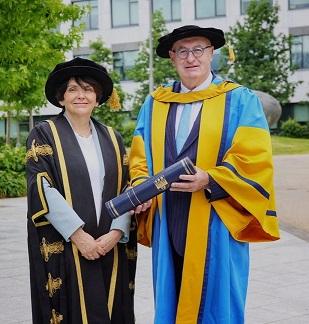Former EU Commissioner Phil Hogan’s been awarded an Honorary Doctorate in Science by UCD.
The native of Tullaroan, Kilkenny at today’s event stressed what he called the “profound wisdom of local communities” and noted that one of the lessons he had learned from his political career was pride of place: “that quiet certainty that an individual belongs.”
He commented; “The sense of having roots, of belonging to a community, is one of the essentials of living. The American psychologist Abraham Maslow put it high up in his hierarchy of needs. Yes, he said, you need safety, you need food and shelter. But – once those are covered off – you absolutely need a sense of belonging. Of being part of a community. A tightly knit community has the strength to be open. Let’s not miss the importance of that. Because openness is the most important lesson that communities in Ireland are teaching us at this time of threat to democracy. Communities are teaching us that identity is not threatened by newcomers, but rather, enhanced by embracing them. Communities are teaching us how to address the great challenges of our time: showing us the power of collective care, collective courage.”
Quoting Tip O’Neill’s observation that all politics is local, Mr Hogan said that Ireland has added a layer to that truth, which is that all Irish politics is accessible. This he defined as meaning that – unique among the countries to which his career has taken him – Irish public representatives and their constituents can meet, one to one, face to face, without formal appointment, almost every day of the year.
“What a fantastic point of pride that is,” he said. “What a fantastic definition of ‘accessibility’ that is. Our politicians are available. Even when availability puts them in harm’s way – as recently happened with our Taoiseach and our Minister for Justice. They – and all of our politicians from all parties – remain accessible. That accessibility allows them to garner the truth. To fully understand the realities behind the short answers given to opinion pollsters. Nowhere is this seen better than during elections like our recent European and local elections – and no other interaction offers a more productive interaction between individual members of the public and individual politicians and aspirant politicians. Of course, when you’re out on the hustings, you’re looking for votes. But the encounter is deeper than vote-getting. It’s about taking criticism. It’s about listening. It’s about giving constituents the greatest gift available to every politician: the gift of attention.”
Nothing, he claimed, equals the gift of attention. He described playwright Arthur Miller’s line “Attention must be paid,” as one of the simplest, weightiest propositions in literature.
“The people of Tullaroan taught me that. And kept hammering home the lesson. Attention must be paid. To individuals. And to communities. Because that attention is what will save democracy.”








